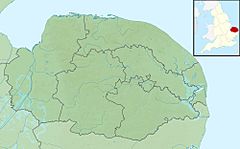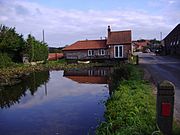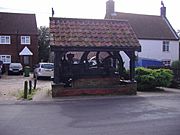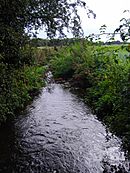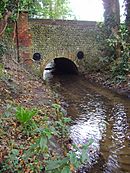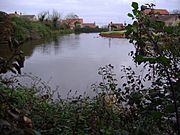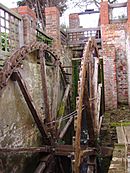River Mun facts for kids
Quick facts for kids Mun |
|
|---|---|
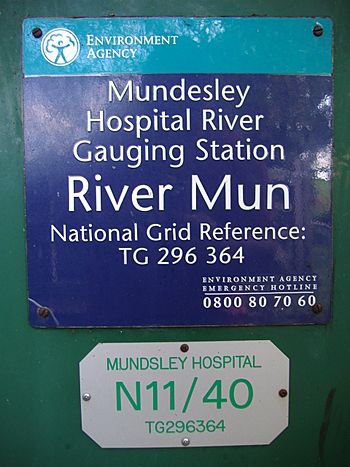
River Mun Gauging Station
|
|
|
Location of the river mouth within Norfolk
|
|
| Other name(s) | Mundesley Beck |
| Country | England |
| Region | Norfolk |
| Physical characteristics | |
| Main source | Northrepps 45 m (148 ft) 52°54′00″N 1°20′25″E / 52.9000°N 1.3404°E |
| River mouth | North Sea Mundesley 0 m (0 ft) 52°52′36″N 1°26′28″E / 52.8767°N 1.4410°E |
| Length | 8.9 km (5.5 mi) |
The River Mun or Mundesley Beck is a river in the north of Norfolk, England. It starts in the village of Northrepps. The river then flows into the North Sea at the village of Mundesley.
Contents
Journey of the River Mun
The River Mun begins near Craft Lane, close to Furyhill plantation. This area is between Northrepps and Frogshall. The river flows southeast through a wooded valley. It passes under Craft Lane near Frogshall Farm House.
From there, it goes through woodlands into a large pool called Little Broad. The river then flows over a small waterfall, called a weir. It enters a marshy woodland known as Osier Carr.
Life in Osier Carr
Deep inside Osier Carr, you can find Freshwater mussels. These mussels are like natural filters for the river. They clean the water by removing tiny plants and other small bits. This helps keep the river water clear and healthy.
The river then goes under another lane from Sidestrand. Many small drains flow into the river here. The Mun then turns south. It passes under Cromer Road and flows through the countryside. It goes towards Ash Tree Farm and Ash Plantation.
River Widens and Flows East
The river gets a bit wider here. It starts to cross open fields, slowly turning southeast again. Along this part, the Mun flows next to several small reservoirs and ponds. These also add water to the river.
Gimingham Watermill: A Historic Stop
At Gimingham, the river flows into a series of mill ponds. These ponds once powered Gimingham watermill. This was the first of two mills on the River Mun. The mill dam held back a large pond, about 20 acres big.
History of Gimingham Mill
There has been a mill at this spot since the time of the Domesday Book. The last mill was built from local brick and flint. The original waterwheel was later replaced. First, steam power was added. Then, in 1912, a turbine was installed. Later, diesel engines were used, but water was still used to cool them.
The mill kept working until November 30, 1976. It used its diesel power to grind animal feed. The old diesel engine is still there on Mill Street. It is a reminder of the mill's past.
Fishing at Gimingham Mill Lake
Gimingham Mill Lake is a very popular place for fishing. In the lake and river, you can catch different types of fish. These include Bream, Carp, Tench, and Roach.
From Gimingham, the river flows east through more farmland. It passes Mundesley Hospital on its left. This hospital is now called the Diana Princess of Wales Treatment Centre. Near the hospital, there is a station that measures the river's water levels. The river then starts to flow along the southern side of Mundesley village.
Mun Valley and Mundesley Golf Course
The valley here is home to Mundesley Golf Club. This golf club started in 1901. It was designed with help from a famous golfer, Harry Vardon. He won the Open Championship six times.
Harry Vardon's Connection
The golf course was built on the rolling hills of the River Mun valley. It has nine holes and 18 tees. Harry Vardon had a long connection with the club. In 1903, he got sick with tuberculosis. He went to a special hospital, a sanatorium, in Mundesley for treatment.
While getting better in 1904, he played a round of golf. He even got his only career hole-in-one on what is now the sixth hole! This amazing shot surely helped him feel better.
River's Final Stretch
From the golf course, the river flows a short distance east. It enters Mundesley village under Trunch Road. Just past Trunch Road, the river flows over another weir. Then, it turns north into the eastern part of the village.
Mundesley Watermill: The Second Mill
The river now fills another mill pond. This is where the second mill on the river once stood. Mundesley watermill was built around 1723. It had two brick floors and a wooden upper floor.
How the Mill Worked
The mill was built deep into a high bank. This allowed water to fall freely to power the mill. The mill had an unusual overshot waterwheel. This means the water flowed over the top of the wheel to make it turn. To get enough water, the river was dammed to create the mill pond we see today.
When the mill was working, 8 million gallons of water flowed through it every day. In the 1920s, the Larter family owned the mill. They even used it to make electricity for nearby homes and businesses.
The Mill's End
Sadly, the mill burned down in November 1956. The remains of the building were finally removed in 1965. The waterwheel was very large, about 26 feet across. The owner of the Mill House decided to keep the wheel as a display.
You can still see the wooden parts and some metal scoops of the wheel. For many years, it would still turn when there was enough water. The river's water flowed over the wheel, then under the road, and finally into the North Sea through a pipe.
Images for kids
 | Bayard Rustin |
 | Jeannette Carter |
 | Jeremiah A. Brown |


